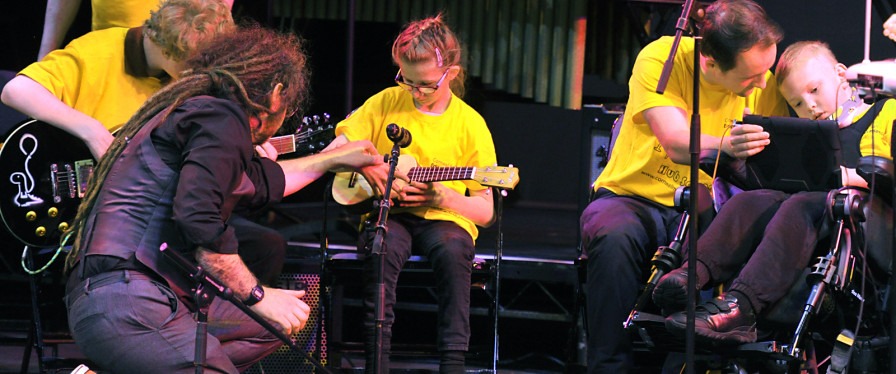Open School Orchestras - sustainability

The Open School Orchestra (OSO) programme has been well-thought-out, having been developed by OpenUp Music over many years. There are aspects to this which mean it has sustainability and ongoing development built in from the start. Having worked on some inclusion projects where lots of good work happens, but it fizzles out in the setting after the end of the project, it's worth noting and learning from how the OSO format increases the chances for sustainability.
There are a number of aspects to sustainability - which mean the OSO project in Cornwall will continue beyond the end of the first year's project....
1. Training
The OSO package involves a music leader working alongside a member of school staff (T.A. or teacher) over a year, also having four days of training plus four days of "supported delivery" where one of the OpenUp Music team work alongside the OSO leaders, offering guidance and inspiration. When combined with some technical support and an online community of other OSOs sharing ideas and good practice, this provides a comprehensive level of support for each orchestra.
Over the course of the year in Cornwall, the music leaders gradually handed the reins of the orchestra over to the school T.A./teacher, so that by the end of the year they were leading their own orchestra. In our case the school staff are very capable and have grown in confidence as music leaders themselves, which means the second year will only require "light-touch" support. It's quite possible schools will be able to continue completely independently after a while - something which, in my experience, rarely happens with musical inclusion projects, but is made possible by the way the OSO support/training is designed.
2. Belonging to a Community
The online community created as part of the OSO programme is a key aspect of sustainability. Rather than being individual schools/projects running music groups, being part of a "growing national movement" (as OpenUp Music describe it on their website), helps create enthusiasm and momentum. Discussion is guided by OpenUp Music so that each project can share not just the inspiration and good ideas, but also the challenges and difficulties. This creates a sense of mutual support and encouragement that makes continuation of projects feasible with less funding and support from music leaders as the school staff grow in confidence.
3. Funding
Part of sustainability for this kind of intensive work with young people having significant Additional Support Needs (ASN) is about funding. In Cornwall, we're fortunate that Cornwall Music Education Hub has agreed to continue funding OSOs in the two existing schools, and start them in two new schools as well. Longer term, we're looking at schools contributing more to the funding, which requires giving them evidence of the benefits:
- for the young people - musically, socially, emotionally, and also for their wider learning in other subjects. Part of the OSO package for schools/hubs includes OpenUp Music's own online evaluation. This collects data at start, midpoint, and endpoint of the project to chart progress, including areas relating to the students' Individual Education Plan. This evidence is useful in demonstrating how the work has value.
- for the school - this change of culture in a school is helped, as OpenUp Music have noted, by the word "orchestra", even though the project is based on community music methods, with student creativity at its heart. Having a school orchestra can appeal to a headteacher's aspirations for their school. Having large-scale performances (photo below) also appeals to school leaders, not just for the benefits for their students' confidence and sense of self-worth, but also as it raises the profile and aspirations of the whole school.
You can find out more about the national OpenUp Music programmes here:
School teacher, Adam Taylor, leading the Pencalenick OSO on stage at Hall for Cornwall:
This project was run by Cornwall Music Service Trust, with funding from Youth Music, and Cornwall Music Education Hub. Photos are by Peter Glaser Photography, and were taken at Cornwall Music Education Hub's showcase event "Hub Sounds".
